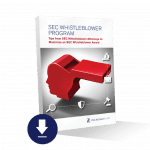
SEC Sanctions: Whistleblower Reference Guide
The SEC Whistleblower Program offers awards to individuals who provide original information that leads to enforcement actions with total civil penalties in excess of $1 million. A whistleblower may receive an award of between 10-30 percent of the total sanctions imposed. The table below identifies some of the largest SEC sanctions.
In FY 2021, the SEC received more than 12,200 whistleblower tips—the largest number of whistleblower tips received in a fiscal year. The most common violations reported by whistleblowers were Manipulation (25%), Corporate Disclosures and Financials (16%), Offering Fraud (16%), Trading and Pricing (6%), and Initial Coin Offerings and Cryptocurrencies (6%).
Sucess of the SEC Whistleblower Program
Since the Dodd-Frank Act went into effect, the SEC Whistleblower Office has awarded more than $1.3 billion to whistleblowers. The information and assistance provided by the whistleblowers who received awards under the program led to successful SEC enforcement actions in which over $5 billion in financial sanctions was ordered.
As discussed in our articles, the SEC Whistleblower Program has become a very effective enforcement tool for the SEC. But very few whistleblowers have received awards, which underscores the importance of having experienced counsel represent a whistleblower effectively at the SEC.
- MarketWatch: More than 33,000 tips, $2.5 billion in financial remedies and $500 million in awards to investors — the SEC’s whistleblower program turns 10 years old today
- Going Concern: Here Are 6 Reasons Why the SEC Whistleblower Program Is Successful
- National Law Review: 5 Ways that Experienced SEC Whistleblower Law Firms Can Effectively Advocate for Whistleblowers
- D&O Diary: How the SEC Whistleblower Program Has Changed Corporate Compliance and SEC Enforcement
- Forbes: One Billion Reasons Why The SEC Whistleblower-Reward Program Is Effective
Washington DC Lawyers Representing SEC Whistleblowers
The whistleblower lawyers at Zuckerman Law represent whistleblowers nationwide and abroad concerning a wide variety of securities law violations that are eligible for SEC whistleblower awards, including:
- Accounting fraud;
- Inadequate internal controls;
- Investment fraud;
- Insider trading;
- EB-5 investment fraud;
- Foreign bribery payments and other violations of the Foreign Corrupt Practices Act;
- Market manipulation schemes;
- Unregistered broker-dealers;
- Investment adviser fraud;
- Offering fraud and Ponzi schemes;
- Inadequate disclosures in communications with investors;
- Deceptive non-GAAP financial measures; and
- Violations of auditor independence rules.
If you have questions about the SEC Whistleblower Program, contact the experienced SEC whistleblower attorneys at Zuckerman Law for a free, confidential consultation about your case by calling 202-262-8959.
The leading SEC whistleblower lawyers at Zuckerman Law have extensive experience representing corporate whistleblowers at the SEC. U.S. News and Best Lawyers® have named Zuckerman Law a Tier 1 firm in Litigation – Labor and Employment in the Washington DC metropolitan area in the 2021 edition “Best Law Firms.”
| Defendants | Date | Sanction | Violations |
|---|---|---|---|
| UBS Securities LLC, et al. | Dec. 2008 | $23 billion | UBS misled investors regarding the liquidity risks associated with auction rate securities (ARS) that they underwrote, marketed and sold. |
| Merrill Lynch, Citigroup, Wachovia, Bank of America, RBC, Deutsche Bank | Aug. 2008 | $20 billion | The banks misrepresented to customers that ARS were safe, highly liquid investments equivalent to money market instruments and cash. The $20 billion represents the combined sanctions against the banks. |
| WorldCom Inc. | July 2003 | $2.3 billion | WorldCom misled investors by overstating its income by approximately $9 billion as a result of undisclosed and improper accounting. Specifically, WorldCom reduced its operating expenses by improperly releasing certain reserves held against operating expenses and improperly reduced its operating expenses by recharacterizing certain expenses as capital assets. |
| American International Group, Inc. (AIG) | Feb. 2006 | $1.6 billion | AIG was charged with improper accounting, bid rigging and practices involving workers’ compensation funds. According to the SEC's complaint, AIG's entered into two sham reinsurance transactions with General Re Corporation that were solely designed to falsely inflate AIG’s loss reserves by $500 million in order to silence analyst criticism that AIG’s reserves had been declining. |
| Adelphia Communications Corporation, et al. | Apr. 2005 | $715 million | According to the SEC's compliant, Adelphia: (1) fraudulently excluded billions of dollars in liabilities from its consolidated financial statements by hiding them on the books of off-balance sheet affiliates; (2) falsified operating statistics and inflated earnings to meet Wall Street estimates; and (3) concealed rampant self-dealing by the Rigas family, including the undisclosed use of corporate funds for purchases of Adelphia stock and luxury condominiums. |
| CR Intrinsic Investors | Mar. 2013 | $601 million | CR Intrinsic Investors allegedly participated in an insider trading scheme involving a clinical trial for an Alzheimer's drug. According to the SEC's complaint, the hedge fund advisory firm discovered negative results about the drug's clinical trial two weeks before they were made public. The firm then tipped several hedge funds about the negative results who subsequently sold off more than $960 million of the securities. The settlement is the largest ever in an insider trading case. |
| Goldman, Sachs & Co., Fabrice Tourre | July 2010 | $550 million | Goldman Sachs misled investors in a subprime mortgage product just as the U.S. housing market was starting to collapse. Specifically, the SEC alleged that Goldman misstated and omitted key facts regarding a synthetic collateralized debt obligation (CDO) it marketed that hinged on the performance of subprime residential mortgage-backed securities. |
| BP p.l.c. | Nov. 2012 | $525 million | BP mislead investors while its Deepwater Horizon oil rig was gushing into the Gulf of Mexico by significantly understating the flow rate in multiple reports filed with the SEC. The oil and gas company made fraudulent public statements about the flow rate of oil per day (5,000 barrels/day) despite its own internal data indicating that the flow rate could significantly higher (146,000 barrels/day). |
| Federal National Mortgage Association | May 2006 | $400 million | Fannie Mae engaged in a financial fraud involving multiple violations of Generally Accepted Accounting Principles ("GAAP") in connection with the preparation of its annual and quarterly financial statements. These violations falsely portrayed stable earnings growth and reduced income statement volatility in order to maximize bonuses and achieve forecasted earnings. |
| INVESCO Funds Group, Inc. (IFG), et al. | Oct. 2004 | $377 million | IFG facilitated widespread market timing trading in mutual funds with which each entity was affiliated. According to the SEC's order, "IFG entered into undisclosed market timing agreements with over 40 individuals and entities, which allowed them to market time certain Invesco funds... At their height, the market timers held over $1 billion of the assets invested in the Invesco funds and made excessive exchanges and redemptions totaling approximately $58 billion. In the aggregate, the market timing trades made under the agreements were detrimental to the Invesco funds’ shareholders." |
| Banc of America Securities LLC, et al. | Feb. 2005 | $375 million | Banc of America Securities LLC allegedly entered into improper and undisclosed agreements that allowed favored large investors to engage in rapid short-term securities trading known as market timing. |
| Siemens AG | Dec. 2008 | $350 million | Siemens violated the FCPA by engaging in a widespread and systematic practice of paying bribes to foreign government officials to obtain business. |
| Merendon Mining (Nevada) Inc., et al. | Nov. 2010 | $310 million | The SEC's complaint alleged that they architected a Ponzi scheme that persuaded more than 3,000 investors across the U.S. and Canada to invest their savings, retirement funds and even home equity. |
| Time Warner Inc., et al. | Mar. 2005 | $300 million | Time Warner allegedly was materially overstating online advertising revenue and the number of its Internet subscribers. |
| J.P. Morgan, et al. | Nov. 2012 | $297 million | Misleading investors in offerings of residential mortgage-backed securities |
| Citigroup Global Markets, Inc., et al. | Oct. 2011 | $285 million | Citigroup mislead investors about a $1 billion collateralized debt obligation (CDO) called Class V Funding III (Class V III). |
| Prudential Equity Group, LLC, et al. | Aug. 2006 | $270 million | According to the SEC's press release, Prudential's registered representatives defrauded mutual funds by concealing their identities, and those of their customers, to evade mutual funds' prospectus limitations on market timing. |
| Bear Stearns & Co., Inc. | Mar. 2006 | $250 million | Securities fraud for facilitating unlawful late trading and deceptive market timing of mutual funds by its customers and customers of its introducing brokers. |
| Qwest Communications International, Inc. | Oct. 2004 | $250 million | Qwest fraudulently recognized over $3.8 billion in revenue and excluded $231 million in expenses as part of a multi-faceted fraudulent scheme to meet optimistic and unsupportable revenue and earnings projections. |
| AXA Rosenberg Group, LLC, et al. | Feb. 2011 | $242 million | Securities fraud for concealing a significant error in the computer code of the quantitative investment model that they use to manage client assets. The error caused $217 million in investor losses. |
| Computer Associates International, Inc., et al. | Sep. 2004 | $225 million | Securities fraud charges for allegedly keeping its books open to record revenue from contracts executed after the quarter ended in order to meet Wall Street quarterly earnings estimates. |
| Morgan Keegan & Company, et al. | June 2011 | $200 million | Fraud charges related to subprime mortgage-backed securities. Specifically, it failed to employ reasonable pricing procedures and nevertheless published the inaccurate daily NAVs and sold shares to investors based on the inflated prices. |
| Roys Poyiadjis, Lycourgos Kyprianou, et al. | June 2005 | $200 million | According to the SEC's complaint, AremisSoft issued fraudulent statements in public filings and press releases, including reporting millions of dollars in sales to entities that either did not exist as operating businesses or did not purchase product from AremisSoft. |
| JPMorgan Chase & Co. | Sep. 2013 | $200 million | Financial fraud in JPMorgan's portfolio of credit derivatives known as the Synthetic Credit Portfolio. |
| Bristol-Myers Squibb Company | Aug. 2004 | $150 million | Allegedly overstated sales and earnings to meet or exceed financial projections. |
| J.P. Morgan Chase & Co. | July 2003 | $135 million | Aiding and abetting Enron Corp.'s securities fraud |
| Credit Suisse | Nov. 2012 | $133 million | Misleading investors in mortgage offerings related to the financial crisis of 2008. |
| Mizuho Financial Group, et al. | July 2012 | $127 million | Allegedly misleading investors in a collateralized debt obligation (CDO) by using “dummy assets” to inflate the deal’s credit ratings. |
| Royal Dutch Petroleum Company | Aug. 2004 | $120 million | Shell overstated proved reserves reported in its 2002 Form 20-F by 4.47 billion barrels of oil equivalent. |
SEC Whistleblower Bounties
SEC Whistleblower Lawyers’ Tips to Qualify for an SEC Whistleblower Award
For more information about the SEC whistleblower process, see the SEC’s investor bulletin on SEC investigations.











